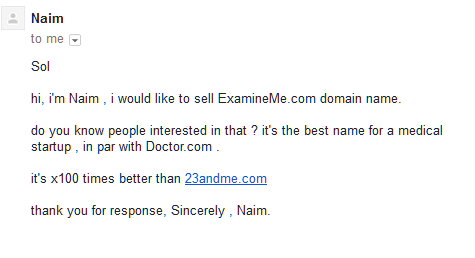The moment I hit publish on why I’ve spent over $250,000 on domain names, I knew what was about to happen.
I even posted a comment about it when I shared the article on Facebook, but I immediately deleted it. I wanted to see how things would unfold…
![]()
They unfolded precisely as I dreaded.
Within 48 hours of publishing that article, I had 17 people email and offer me their incredibly shitty domain names.
Sigh.
A case study in networking and relationships
One of my bugaboos about people writing about entrepreneurship/productivity is they almost exclusively focus on the theory/woo, and rarely on the practical applications/reality.
(You also have the motivational gurus who just focus on the woo)
In the context of networking, relationships, and opportunities let this article be a case study on how to do it wrong, how to do it ok, and how to do it well.
Every time someone publishes anything, it’s an opportunity
Every time someone publishes anything – from an article in a magazine to a tweet, it’s an opportunity. It’s them putting out what’s of interest to them, and if you have any kind of alignment, it’s your chance to develop that relationship.
My article on domain names had many many threads you could have connected with me on:
- Domain names (duh)
- Pets
- Online gaming
- ccTLDs
- Me being impulsive
- Real estate
- Naming (hell, I legally changed my full name)
- Budgeting
- Liquidity
- Traveling (I mention being in Colombia)
- Brokering
While my post was ostensibly about buying a domain name, I dropped so many potential points of interest that I essentially served up a multitude of avenues for you to connect with me.
And some people did take that approach.
One person mentioned that domain names are like logos – great to have, but not necessary (loved that analogy). Another one gave me some more background on uber.com. Another one talked about my online gaming experience.
Excellent!
But by the by, when it comes to networking, boy are people singular minded…
Anytime someone publishes anything (on any medium), they give you potential points you can engage with them on
Doing it wrong
What was kind of wondrous about the 17 people who contacted me was that not a single person tried to build up any rapport.

Instead, every single person went straight to pitching me their (shit) domains.
Some of the most egregious examples:
- Not even bothering to include my name. One of them was just “Dear Sir/Madam”
- Offering me supplement-related domains (when I specifically wrote about why I did not want a supplement domain)
- Offering me .tv domains (but why?)
- Not even bothering to contact me through SJO.com (it says Contact right at the top). They just did a WHOIS lookup on SJO.com and emailed that address!
One person who offered me a supplement-related domain name even suggested I was dumb for using Examine.com as the domain and should sell it and use a supplement-related domain.
Sigh x 2.
I wanted to shake every single one and yell:

It’s not a tall order to put yourselves in my shoes – would I want the domain you’re offering? Would I want your unsolicited sales pitch? Have I not given you different topics to touch upon?
It was such ‘mememememe’-ism that I can even imagine these same people grumbling about how hard they work, not realizing that you need to apply a modicum of intelligence and strategy.

Originally I was replying with a pithy “pass” (sans capitalization or even punctuation).
One person took that as sign of encouragement and back with an offer to invest in some gaming app company of theirs for the low price of $10,000.
I stopped responding right after that.
When reaching out to someone, don’t make it about you, and don’t go for a hard sell on the first contact
Doing it OK
A smarter approach would have been to take a step back and abstract what you learned about me through the article.
Assuming you are in the domain industry, you can deduce:
- I appreciate the value of domains
- I buy domains to develop, not re-sell
- I know other domainers
- I have a solid budget
- I change industries often
- I like memorable/generic domains
- I have done this (not just talk)
Using those data points, a better approach (which no one did) would have been to reach out and offer any help in the future. That if I wanted, they would be happy to let me know about any interesting generic domain names they came across, up to whatever amount I wanted.
That if I’m ever looking to buy a domain in a specific market or industry, to just ping me, and that they can help.
Boom!
Just by being a non ‘mememememe’ human being, a person can instantly separate themselves from everyone else.
Realize someone else’s strengths and then help them with their weaknesses. Be complementary.
Doing it well
So we got the chaff out of the way. How about the wheat?
Unsolicited, without even telling me, this article went up: This entrepreneur spends thousands on domain names for his startups – here’s why you should too.
Brilliant. Kudos to Jay Kim.
Jay saw an interesting story (spending $ on domain names), realized he could present the underlying message to another audience, and made it happen.
Now – I already know Jay (I’ve been on his podcast). But imagine if someone I did not know had done that. It would have been the perfect segue into building a connection and a relationship.
Since I did already know Jay, it further strengthened our relationship.
The article itself is simple. He took my article, framed it with storytelling (the frustration and importance of finding a domain name), explained why I did it, and gave it context in the big picture.
Even better, he linked both to SJO.com, Examine.com, and deep-linked to the article. And to make it even better for Forbes, he linked to other articles that further expounded on the topics he broached upon.
As an aside, I want to note how great his CTA/text is for his bio.
Most writer biographies are so boring – “<Person> is a best-selling author in <industry>, and <insert “quirky” fact>.”
Boring.
Jay’s bio is brilliant – the first sentence is a headline that catches your attention. After that, if you are interested in investing in Asia… well, the rules are different, but no worries: Jay has your back.
Going back to what Jay did…
He didn’t rush out to tell me about it the moment it went up.
I have notifications enabled for SJO.com and “Sol Orwell” (anyone who has any brand, be it a business and/or personal, it behooves you to keep an eye on mentions of you, so I knew about the Forbes article right when it went up.
And ordinarily, I would have immediately pinged him thanks. But with me packing for Seattle, I was a bit pressed for time.
(In fact, I wrote this article on my way to Seattle)
And so he waited about a day to just give me a heads up.
In the meantime, I had three friends find the article and let me know about it.
Jay was smart – he leveraged what he had, and as a result, built a stronger relationship (and links from this site and exposure to my audience).
Leverage what you already have to make someone else’s life easier/better; don’t necessarily rush out to tell them about it immediately.
Don’t be a parasite
The domainers tried to be parasitic. Jay was symbiotic. You don’t need to be a rocket scientist to figure out which strategy works best over the long-haul.
Honestly, every piece of output anyone generates is a potential opportunity to build a (deeper) relationship with someone. Don’t be selfish – don’t make it about you. Make it equitable, and your network will grow leaps and bounds.

Leave a Reply